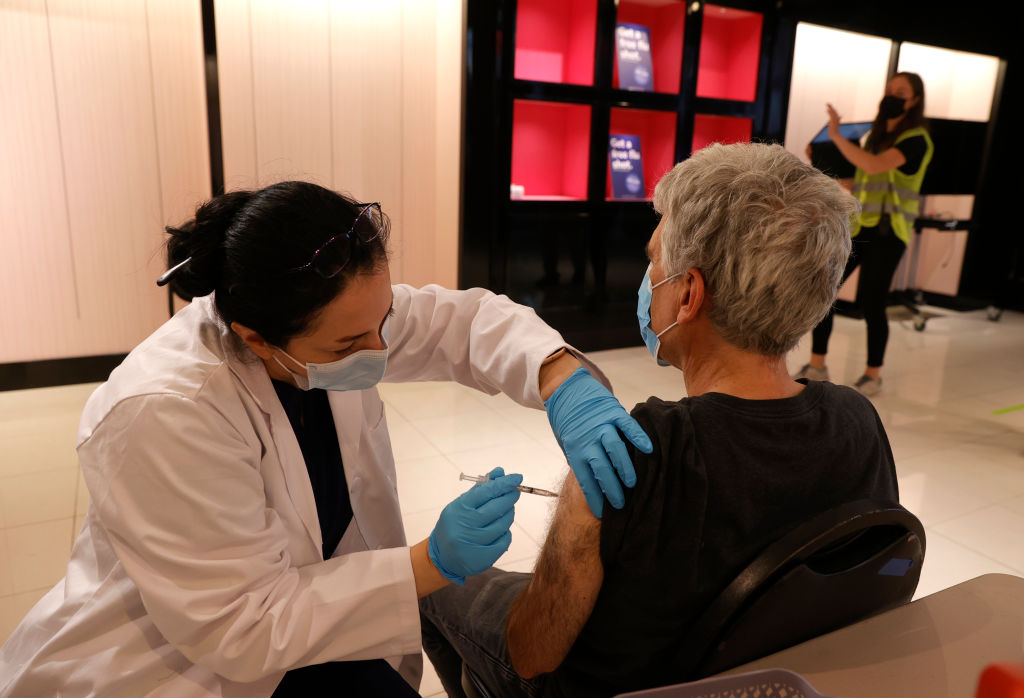How COVID boosters could be deepening vaccine skepticism


A free daily email with the biggest news stories of the day – and the best features from TheWeek.com
You are now subscribed
Your newsletter sign-up was successful
COVID-19 boosters have arrived — and with them, of course, plenty of debate. While health and administration officials reportedly remain at odds over the proper timeline in which to roll out third doses, unvaccinated hold-outs stand steadfast in their relunctance, writes The New York Times, perhaps even hardening in their skepticism thanks to the "mixed messages" from the booster campaign.
"It seems like such a short time and people are already having to get boosters," said Christopher Poe, an unvaccinated manufacturing worker who grew more skeptical about the shot due to the third-dose discourse. "And the fact that they didn't realize that earlier in the rollout shows me that there could be other questions that could be out there, like the long-term effects."
A September vaccine monitor survey from the Kaiser Family Foundation seemed to echo Poe's concerns. There, 71 percent of unvaccinated respondents said they believe the need for boosters means the vaccines aren't working. Officials also fear parents with young children will feel similarly skittish regarding efficacy when the time comes to inoculate their kids.
The Week
Escape your echo chamber. Get the facts behind the news, plus analysis from multiple perspectives.

Sign up for The Week's Free Newsletters
From our morning news briefing to a weekly Good News Newsletter, get the best of The Week delivered directly to your inbox.
From our morning news briefing to a weekly Good News Newsletter, get the best of The Week delivered directly to your inbox.
The result is "really two different types of campaigns" in the U.S., Dr. Jennifer Avegno, director of the New Orleans health department, told the Times. Physicians are encouring vaccinated the vaccinated to come in for boosters while simulataneously struggling "to defend the need for the third shot to those who have yet to get their first."
Meanwhile, an FDA advisory panel will meet Thursday and Friday to debate booster doses of both the Moderna and Johnson & Johnson vaccines, CNBC reports. Currently, only Pfizer and BioNTech's vaccine has been authorized for use.
As of Saturday, over 7 million Americans had received a booster dose. Read more at The New York Times and CNBC.
A free daily email with the biggest news stories of the day – and the best features from TheWeek.com
Brigid Kennedy worked at The Week from 2021 to 2023 as a staff writer, junior editor and then story editor, with an interest in U.S. politics, the economy and the music industry.
-
 The environmental cost of GLP-1s
The environmental cost of GLP-1sThe explainer Producing the drugs is a dirty process
-
 Greenland’s capital becomes ground zero for the country’s diplomatic straits
Greenland’s capital becomes ground zero for the country’s diplomatic straitsIN THE SPOTLIGHT A flurry of new consular activity in Nuuk shows how important Greenland has become to Europeans’ anxiety about American imperialism
-
 ‘This is something that happens all too often’
‘This is something that happens all too often’Instant Opinion Opinion, comment and editorials of the day
-
 A Nipah virus outbreak in India has brought back Covid-era surveillance
A Nipah virus outbreak in India has brought back Covid-era surveillanceUnder the radar The disease can spread through animals and humans
-
 Trump HHS slashes advised child vaccinations
Trump HHS slashes advised child vaccinationsSpeed Read In a widely condemned move, the CDC will now recommend that children get vaccinated against 11 communicable diseases, not 17
-
 Covid-19 mRNA vaccines could help fight cancer
Covid-19 mRNA vaccines could help fight cancerUnder the radar They boost the immune system
-
 FDA OKs generic abortion pill, riling the right
FDA OKs generic abortion pill, riling the rightSpeed Read The drug in question is a generic version of mifepristone, used to carry out two-thirds of US abortions
-
 The new Stratus Covid strain – and why it’s on the rise
The new Stratus Covid strain – and why it’s on the riseThe Explainer ‘No evidence’ new variant is more dangerous or that vaccines won’t work against it, say UK health experts
-
 RFK Jr. vaccine panel advises restricting MMRV shot
RFK Jr. vaccine panel advises restricting MMRV shotSpeed Read The committee voted to restrict access to a childhood vaccine against chickenpox
-
 Texas declares end to measles outbreak
Texas declares end to measles outbreakSpeed Read The vaccine-preventable disease is still spreading in neighboring states, Mexico and Canada
-
 RFK Jr. shuts down mRNA vaccine funding at agency
RFK Jr. shuts down mRNA vaccine funding at agencySpeed Read The decision canceled or modified 22 projects, primarily for work on vaccines and therapeutics for respiratory viruses
